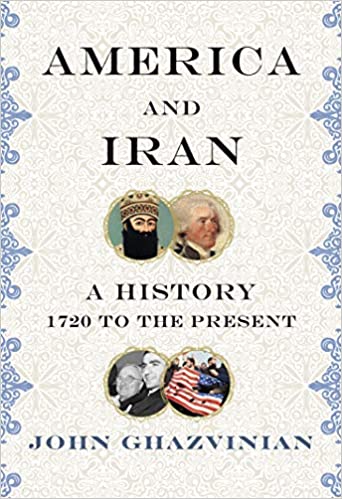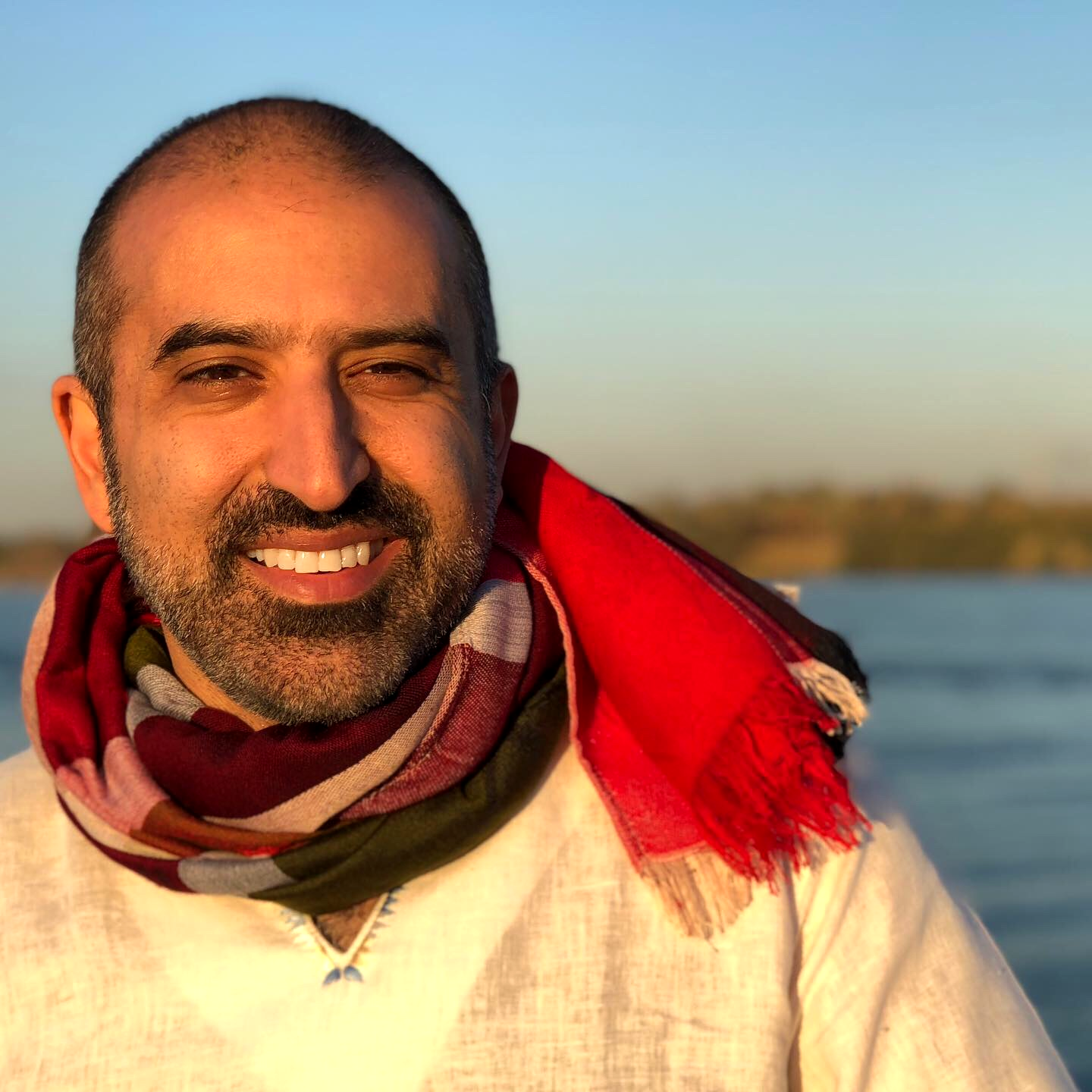OMNIA Q&A: The Long Courtship and Bad Breakup of the U.S. and Iran
John Ghazvinian, Executive Director of the Middle East Center, on his new book, which covers 300 years of U.S.-Iran relations.
When Americans think of the history of U.S.–Iran relations, they tend to think of 1979, the year revolutionaries occupied the U.S. embassy in Tehran and took 66 hostages. The two nations, though, have a relationship that goes back 300 years, beginning when Iran was still Persia and the U.S was not yet a country. In his new book, America and Iran: A History, 1720 to the Present, John Ghazvinian reports that the two had something of a mutual admiration society for much of that time. What happened? We asked Ghazvinian, the Executive Director of the Middle East Center, about that history, his research, and his goal of writing a book that was both academic and accessible.
Ghazvinian was born in Iran, though his family moved when he was one, first to England and then to Los Angeles. He earned a Ph.D. in modern British history at Oxford, then worked as a journalist. His first book was Untapped: The Scramble for Africa's Oil, and he is coeditor of American and Muslim Worlds before 1900, released last year.
What inspired you to write this particular book?
I knew this wouldn't be the first book or the last on the topic, but I was trying to do a few things that I think hadn't been done before, and one was to take the story all the way back to the beginning. And even before the beginning, the kind of prehistory of U.S.–Iran relations—the preconceived notions that these two cultures and civilizations had of each other before they even came into contact. Because I think a lot of that stays with us right through the 1970s in many ways.
I also was bringing Iranian archives into the story. The way U.S.–Iran history has been told in the past has tended to rely on the archives of one country or the other, and that resulted inevitably in skewed perspectives. For example, when American historians approach this topic, typically they start in the 1940s because the U.S. was really an isolationist power before 1940. The problem with that is you are basically communicating that the history of U.S.–Iran relations only becomes important once the U.S. becomes interested.
I discovered that generations of Iranian governments were very, very interested in cultivating closer ties with the United States, dating back to the 1850s. One government after another really felt it was an important strategic priority to balance out the pressures Iran was feeling from Russia and from the British Empire by cultivating a better relationship with a third force.
They felt that the U.S. was a country that would understand Iran, that it was a country that had come into existence in a revolution against the British Empire, that it was anti-imperialist and didn't seem to have any interest in interfering in the affairs of smaller and weaker countries. That was very much the case in the 19th century, and the way the U.S. was perceived in Iran through the middle of the 20th century.
I also tried to write a book that would be useful to scholars and experts who already know a lot about U.S.–Iran relations, but it was very important to me that I write it in a way that was accessible to a general audience, the kind of book that you could give to your uncle who loves to read history, that there should be life and passion in the way that the story was told.
Was your ability to go into the Iranian archives unique?
Most archives in Iran are not particularly difficult to get access to, although going to Iran in the first place can be challenging for Americans. I have dual nationality, so going to Iran was not an issue, but the foreign ministry archive was challenging. That was a question of constantly going in and annoying them day after day. The access I got was limited, but I believe I'm one of the very, very few historians or researchers from outside Iran who had been able to get access.
What went wrong between the U.S. and Iran?
In 1953, the CIA got the U.S. into a covert operation, a coup, to overthrow the very popular prime minister Muhammad Musaddiq. Musaddiq had nationalized the Iranian oil industry, which until then had been in the hands of a British company, the Anglo Iranian oil company, which later became BP. The British tried to undermine the Musaddiq government and failed and were thrown out. Iran cut off relations with the United Kingdom in 1951. The British felt that the Iranian government was being unreasonable and even illegal in trying to nationalize. the oil concession.
The British tried to convince the Eisenhower administration that Iran wasn't really ready for democracy and that it would destabilize the country, that the Soviet Union would take advantage of it. And that was a message that the incoming Eisenhower administration was very receptive to at the height of the Cold War, and it gave its backing to this covert operation.
There is a narrative that the U.S. installed the Shah. It wasn't quite like that. The Shah had already been in power. He fled the country for a few days during the turmoil and was brought back into power. He drifted in a much more dictatorial direction in the 1960s and 1970s, especially with the oil boom, and he had a really brutal kind of secret police apparatus.
And then in 1979, there was a large backlash to the Shah's government, the Iranian revolution. That was not initially an anti-American revolution, but after the Shah was deposed, he was admitted to the United States for cancer treatment. The revolutionaries were skeptical about that because 25 years earlier their aspirations had been overturned by a plot cooked up in the U.S. embassy. They stormed the U.S. embassy in protest, and to send a message to say they wanted the Shah back for trial.
That hostage crisis was supposed to go on for just a few days. And it took on a life of its own because of a number of domestic Iranian machinations, and ended up becoming a prolonged crisis, the 444 days For the Iranians, the U.S. embassy became a kind of an insurance policy against any kind of American attempt to overthrow the revolution. The U.S. broke off relations with Iran in April of 1980 and has never restored ties.
I don’t think 1953 and 1979 explain why the Iran and U.S. cannot put aside their differences today. I think they could get past those things pretty easily if they wanted to, but enough other grievances have accumulated in the last 42 years and it's taken on, I think, a sort of self-fulfilling life of its own. These things get ossified, they get solidified.
Iran’s history is so much longer than the U.S.’s. Do you think that’s affected their relationship?
I do think that Iran has a certain level of pride about its long history. And that's in the background when they perceive U.S. bullying or being told by the U.S. that they can or cannot enrich uranium, for example. But I think what's even more interesting is that the two countries in their present form share some historical similarities. Both are political entities that came to power in a revolution. And that means that they have that ideology, and even that a certain sense of exceptionalism is integral in the way they look at themselves on the world stage. I don't want to kind of push this too far, but I think Iran often sees itself as a sort of leader in its region, leader in the Muslim world as perhaps having a more strong and vocal revolutionary ideology than some of the other governments in the region. And it sometimes feels that the burden falls to Iran to fight some of these battles that other governments are not willing to. And in a way that is very similar to the way that American politicians sometimes refer to the Europeans.
Do you have any predictions for the future?
As a historian I'm more comfortable in the past than in the present, much less the future. Things can change very quickly. Negotiations in Vienna with the JCPOA seem promising, but there are plenty of actors, both in Iran and in the U.S., that would love to see things fall apart, that have a vested interest in maintaining this atmosphere of negativity and hostility. And they're very good at introducing problems.
The Iranian election is on June 18, and there has been a great deal of emphasis placed by the current administration in Iran to try to resurrect the nuclear deal and to get sanctions lifted, because this was their flagship foreign policy achievement. The U.S.’s withdrawal from the JCPOA in 2018 has made it possible for hardline anti-American elements in Iran to point a finger at the current administration there, which is slightly more reformist, more pragmatic, more open to dialogue, and to say, you see, you cannot trust the United States.
So indications would be that a more hardline president is likely to win this election. I think the Biden administration would also love to get back into a quick deal if possible, so we'll see. There are a lot of reasons to be hopeful, but I don't know.




